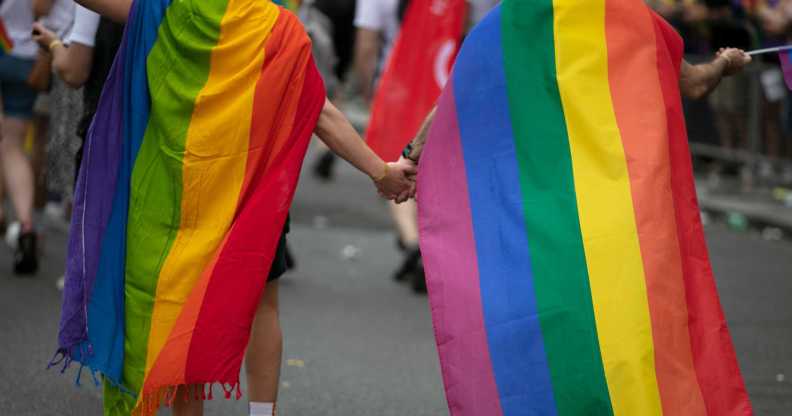LGBTQ+ kids become unhappy adults if not supported by family and schools, research finds

Unsupported LGBTQ+ youth face significant challenges which continue into adulthood, a new report has found (Canva)
LGBTQ+ people are much less likely to be happy in adulthood if they were not supported at home and school when they were younger, a new report has revealed.
The finding has been unearthed in research conducted for Just Like Us, the LGBT+ young people’s charity, which examines the disproportionate challenges queer young people face at home, in school and in their early working life.
The Positive Futures report surveyed 3,695 people aged 18 to 25, across the UK, including a pool of 1,736 queer young adults, and identified a link between a lack of LGBTQ+ support in childhood and negative outcomes for mental health, wellbeing and career prospects in early adulthood.
“Support” is defined in the study as the combination of a number of factors, including if people are estranged from their family, how their school spoke about LGBTQ+ people and if they had any LGBTQ+ role models in their life as a youngster.
Growing up without support has a long-lasting and devastating impact on young people, the report concludes.

When compared with LGBTQ+ people who grew up with support, both at home and in school, the survey found those who lacked it are half as likely to say they are happy in adulthood (43 per cent compared with 85 per cent).
The group without support are also less likely (41 per cent compared with 89 per cent), to feel good about themselves, close to four times more likely to “rarely or never” feel close to other people and even more likely to feel ashamed of being LGBTQ+ – a staggering 41 per cent compared with just nine per cent.
The research and its findings reveal the wide-ranging impacts a lack of support has on people in the long term across various aspects of their lives. So much so that in later adulthood, 42 per cent of the people surveyed who were unsupported in their youth “never or rarely” feel optimistic about their future. This figure is significantly higher than those from supported backgrounds who felt the same way – just 12 per cent.
Unsupported young adults were also half as likely to feel confident they would find a life partner (34 per cent compared with 70 per cent) and go on to have children (25 per cent to 49 per cent).
In terms of people’s mental health, those who come from unsupported backgrounds were also almost twice as likely to have suicidal thoughts and feelings (85 per cent compared with 39 per cent), have self-harmed (71 per cent vs 33 per cent) and were more likely to have suffered panic attacks and depression – 60 per cent and 82 per compared with 28 per cent and 42 per cent respectively.
Be vocal in your support, charity says
Amy Ashenden, the interim chief executive of Just Like Us, described the findings of the report as heart-breaking, saying the impacts of a lack of support were prolonged and devastating.
“From their mental health, hopes for the future and career prospects to their relationships with themselves and others, our Positive Futures report clearly shows that supporting LGBT+ children is absolutely vital for their chances of happiness and success as adults,” she said.
Ashenden urged those who work with, or care for, LGBTQ+ youngsters to read the report and “be vocal about their support”.
She added: “Young people desperately need to hear that the adults in their lives unequivocally believe that being lesbian, gay, bisexual or trans does not make you lesser than, but is, in fact, something to be celebrated. Otherwise, we will see another generation facing the heart-wrenching outcomes detailed in the report.
“I’d like to particularly call upon teachers to join us in taking part in School Diversity Week this 26 to 30 June, and show young people that being LGBT+ is nothing to be ashamed of – a message young people still desperately need to hear in their every-day lives.”

‘When we support LGBT+ young people, we create a keystone that bridges divides’
The report sets out a number of recommendations for care-givers and school staff, to ensure LGBTQ+ youngsters are able to flourish later in life.
Care-givers should not skirt around LGBTQ+ topics but should speak openly about their support for the community to the young people they know, enabling youngsters to realise they are in a safe place to come out and be who they are.
Schools should be safe spaces for LGBTQ+ pupils, especially those who may face estrangement from their family because of their identity, the report continues.
Teachers can do this by setting up Pride groups, speaking positively about the LGBTQ+ community and ensuring anti-LGBTQ+ bullying is not tolerated.
The report reiterates that support is “everything” to young people, especially if they are LGBTQ+.
The authors of the report say that schools creating LGBTQ+ positive environments can improve young pupils’ lives outside it, as well as the lives of queer teachers and staff, and their straight peers.
“When we support LGBT+ young people, we create a keystone that bridges divides and provides a structure that helps everyone. That is our aim with this report,” the authors assert.
How did this story make you feel?

